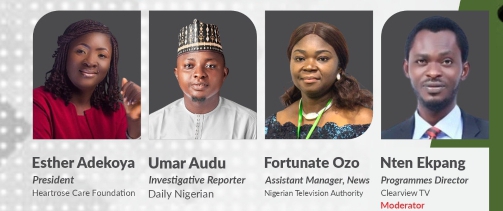By JADESOLA ABOLAJI
Suggestions have been offered to address mental health challenges journalists are experiencing on duty in the country.
The suggestions were made by panellists at the Journalism and Society Conversation on X Space organised by the Wole Soyinka Centre for Investigative Journalism, WSCIJ, on Tuesday, September 17, on the theme “Beyond the Byline: Prioritising Journalist’s Mental Well-Being for Resilient Media.”
The speakers included Umar Audu, an investigative reporter with Daily Nigerian Newspaper; Assistant Manager, News, Nigeria Television Authority, NTA, Fortunate Ozo; President of Heartrose Care Foundation, Esther Adekoya, and other media professionals, civil society media advocates, human rights activists, representatives from both private and public sector, and journalism students participating.
Ozo recommended that every newsroom should have a a mental health desk to detect and tackle the challenges along with an effective employer/employee relationship in which they can open up to them.
“There should not be a case where the employee goes through some challenges like trying to beat deadlines and whatnot and every media house should have a recreational space to unwind after a hard day’s work.”
Adekoya recommended external and internal lifelines for journalists to help themselves.
READ ALSO: Earth tremor: FCT constitutes emergency preparedness committee
For Internal lifeline, she said, “one has to have self-care, self-love, self-acceptance, emotional awareness/management, build positive resilience, choose one mood (has the power to decide what mood is right for a situation), and find a good support system, be it family, friends or trusted ones.”
Regarding external lifeline, Adekoya said that there should be “a relationship between the employers and employees, de-breathing (reflecting on a situation even after it has occurred, what to improve on, what went wrong, what could have been done effectively), managers must be tellable, and get some counselling – ‘a problem shared is 50% solved.’”
On resources and strategies that could be used to combat mental health challenges, Umar said he reads books, does midnight prayers, reads his Quran, and shares his concerns with people he is most comfortable with, especially his wife.
On other support systems newsrooms should establish to help employees manage mental health challenges, Ozo suggested dialogue and also gave a personal experience of when she had a miscarriage because she was going through some difficulties but could not voice out.
“We should have a listening ear for newsroom staff. Reporters should be judged based on antecedents,” she suggested.
Adekoya stated that employers should know that the wealth of a media house is not in human resources, but its human capital.
Noting that silence builds misunderstanding and prejudice, Adekoya said Human Resources personnel should create a space where journalists can open up and take time off to rejuvenate.
“One should not impress anybody and managers should be such that employees can tell them what is going on. One should also be emotionally intelligent, and identify and control their trigger,” she added.
She encouraged everyone to have emotional health goals, enhance their self-awareness, and understand their emotions.
“They should cultivate a positive outlook with positive affirmation. Celebration of little wins and achievements and improvement of work-life balance go a long way,” she said.














